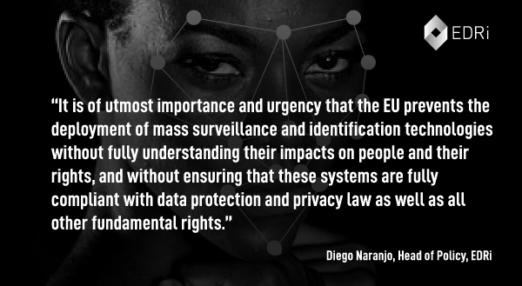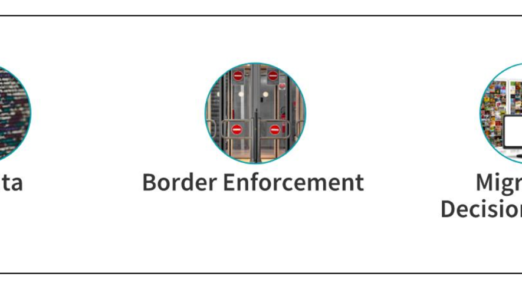Surveillance and data retention
Surveillance is when an individual or organisation is watching, tracking, filtering, analysing or blocking what you can see and do online or offline. It can be targeted on a specific individual (such as someone suspected of a crime) or it can be done indiscriminately (such as on all users from a particular country), also known as mass surveillance. Surveillance - and the retention of surveillance data - can impose restrictions on our fundamental rights in the digital environment by interfering with our freedom online, or by using digital technology to follow our offline movements, in order to gain an intimate picture of our lives, our beliefs and our interactions.
Filter resources
-

Immigration, iris-scanning and iBorderCTRL
Technologies like automated decision-making, biometrics, and unpiloted drones are increasingly controlling migration and affecting millions of people on the move. This second blog post in our series on AI and migration highlights some of these uses, to show the very real impacts on people’s lives, exacerbated by a lack of meaningful governance and oversight mechanisms […]
Read more
-

Click here to allow notifications in cross-border access to data
From a fundamental rights perspective, it’s essential that the proposal enabling cross-border access to data for criminal proceedings (“e-evidence”) includes a notification mechanism. However, this requirement of a notification seems to be out of the question for those advocating for “efficiency” of cross-border criminal investigations, even if that means abandoning the most basic procedural safeguards […]
Read more
-

Swedish law enforcement given the permission to hack
On 18 February 2020, the Swedish parliament passed a law that enables Swedish law enforcement to hack into devices such as mobile phones and computers that the police thinks a suspect might use. As with the recent new data retention law only one party (and one member of another party) voted against the resolution (286-26 […]
Read more
-

A human-centric internet for Europe
The European Union has set digital transformation as one of its key pillars for the next five years. New data-driven technologies, including Artificial Intelligence (AI), offer societal benefits – but addressing their potential risks to our democratic values, the rule of law, and fundamental rights must be a top priority. “By driving a human rights-centric […]
Read more
-

PI and Liberty submit a new legal challenge against MI5
Read more
-

The human rights impacts of migration control technologies
This is the first blogpost of a series on our new project which brings to the forefront the lived experiences of people on the move as they are impacted by technologies of migration control. The project, led by our Mozilla Fellow Petra Molnar, highlights the need to regulate the opaque technological experimentation documented in and […]
Read more
-

Dangerous by design: A cautionary tale about facial recognition
In this fifth and final installment of EDRi's facial recognition and fundamental rights series, we consider an experience of harm caused by fundamentally violatory biometric surveillance technology.
Read more
-

Double legality check in e-evidence: Bye bye “direct data requests”
After having tabled some 600 additional amendments, members of the European Parliament Committee on Civil Liberties (LIBE) are still discussing the conditions under which law enforcement authorities in the EU should access data for their criminal investigations in cross-border cases. One of the key areas of debate is the involvement of a second authority in […]
Read more
-

Digitalcourage fights back against data retention in Germany
On 10 February 2020, EDRi member Digitalcourage published the German government’s plea in the data retention case at the European Court of Justice (ECJ). Dated 9 September 2019, the document from the government explains the use of retained telecommunications data by secret services, the question whether the 2002 ePrivacy Directive might apply to various forms […]
Read more
-

ECtHR: Obligation on companies to identify all phone users is legal
On 30 January 2020, the European Court of Human Rights (ECtHR) issued its judgment on the Breyer VS Germany case.
Read more
-

AG’s Opinion: Mass retention of data incompatible with EU law
Read more
-

Data retention: “National security” is not a blank cheque
On 15 January, Advocate General (AG) Campos Sánchez-Bordona of the Court of Justice of the European Union (CJEU) delivered his opinions on four cases regarding data retention regimes in France, Belgium and the UK, in the context of these Members States’ surveillance programmes.
Read more
